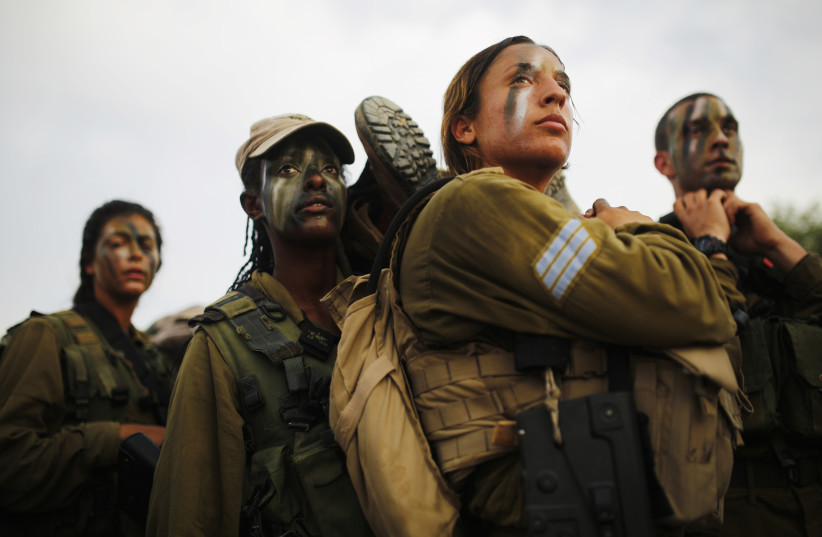On Wednesday, my daughter joined that selfless band of young Israelis who give up the best years of their lives to defend their country when she became a soldier in the IDF.
Unlike her brothers before her, who were drafted into ground forces units, my daughter will serve in the Air Defense unit of the Israeli Air Force.
For all young Israelis, their yom giyus (draft day) is one of the most important of their lives. Much of their latter school years are spent preparing for this day, with the tsav rishon (first draft) kicking off the whole process at the tender age of 15.
Thereafter, many youngsters attend various gibushim (trials) and interviews in the hope of being accepted into one or other of the various units. Ultimately, however, it is the army that decides where each new recruit will serve, despite their preferences.
In light of the current situation, we were a little apprehensive about our daughter’s draft earlier this week. With a war being fought on two fronts, necessitating the call-up of a further 360,000 reservists as well as all those currently serving, we half-expected her draft date to be altered.

How would they deal with a new intake of soldiers, fresh out of school in most cases, when the army was already stretched to capacity?
In the circumstances, we needn’t have worried. From the get-go, there was never any suggestion that the date of our daughter’s draft – or that of any of her friends who are also enlisting this month – would be altered. It was business as usual, as far as the army was concerned, meaning we could swing into action and get her ready for her service as planned.
Having spent the past few weeks chasing around to ensure she had everything she needed, our daughter was well-prepared as the big day approached.
When my firstborn son – who also happened to be the first person in our family to serve in the IDF – drafted three years ago, COVID was at its height. Consequently, his yom giyus was a rather muted affair. Families weren’t allowed onto the army base where the new recruits meet, so we simply said our goodbyes at the curbside, and off he went.Our youngest son began his service a year later when the pandemic was still around, meaning his big day was marred too.
Having your child draft during a war
MY DAUGHTER’S draft earlier this week, on the other hand, couldn’t have been more different.
My husband and I took her to the base with one of the boys with the intention of replicating the curbside goodbye of three years ago. As we neared the drop-off point, however, I noticed a man walking across the busy main road toward the base clutching half a dozen, or so, blue and white balloons.
We stopped the car in the same spot as before and helped our daughter gather up her things (a heavy rucksack and a separate IKEA bag housing her duvet and bedding).
It was then that we realized that huge swathes of people were heading into the base – parents, siblings; young and old – even pets.
Upon further investigation, it transpired that everyone was welcome to go with their children to wave them off.
Once inside, the mood was extremely positive.
Youngsters, about to embark on what would be, for many, a difficult and dangerous service, laughed and joked with their families and friends as they waited to board their buses. Selfies and group photos were taken as younger siblings looked on, some eating their breakfast (it was quite early).
For a country at war, the scenes that I witnessed were quite extraordinary. Of course, there were those who, like my daughter, were nervous about venturing into the unknown by themselves; generally, kids don’t draft into the same units as their friends, and those who do are very lucky.
And then there were the parents who, like me, were apprehensive about waving their children off, not knowing when they might see them again, or what they’ll be doing while they’re away.
Once your child drafts, they become the property of the army, which requires a huge adjustment by everyone. No longer can they come and go as they please. No longer can we, their parents, see them whenever we like. Day trips, family holidays, and meals out are few and far between, if they happen at all.
Drafting into the army, therefore is difficult at the best of times, which these certainly aren’t. Hundreds of soldiers were murdered on October 7 and many more have fallen since then in the ensuing war. The country is now facing one of the most challenging periods since its inception 75 years ago.
And yet, the youngsters who drafted earlier this week were not deterred.
As I sat with my daughter, I watched in awe as, one by one, the new recruits made their way down the makeshift walkway to their buses, lugging heavy suitcases or rucksacks, as their anxious parents put on brave faces and cheered them on.
Only when they were safely out of sight did the tears flow, as I later discovered.
When my daughter’s turn came around, it was all I could do not to cry as I hugged her tightly before watching her walk away toward the bus.
Happily, she took a seat by the window nearest to me, so I could get one last glimpse of the young, carefree girl whom I cherish with every fiber of my being before she embarked on her new life as a soldier, far away from everyone and everything she knows and loves.
Such is the calling for our young men and women who selflessly put duty before all else, in good times and bad, and without whom Israel would cease to exist.
The writer is a former lawyer from Manchester, England. She now lives in Israel, where she works at The Jerusalem Post.
